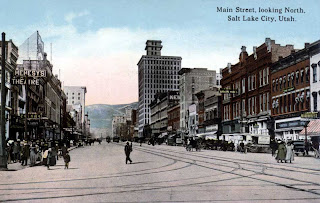Salt Lake City: watching a t.v. film of the Lewis-Clark expedition last night. Clark took along a slave, and it was him the Indians found exotic. They gave him some honored name that I've forgotten.
This story told by an Indian, a descendant of the tribe who gave hospitality to the explorers. It has remained vivid memory for them.
And that makes me think of when and what we remember, in history. We recall the Lewises, the Clarks, but not the thousands of nameless laborers who made their memorable accomplishments possible. My passion as an historian has always been to give those others faces, to make their voices speak.
I am an historian. I am a theologian. I'm a writer. Those words trip off the tongue. I like the sound of them. Are they true? Is it possible to make them true? My strategy: detach if I can, slow down, and relinquish expectations. See what happens then.
Surrealistic conversations all around. I listen shamelessly for . . . a clue? It starts on the shuttle to the airport. Three young women I first encountered in the hotel accompany us. The one who fascinates me has a mask-like face, lips as if they've been permanently pushed apart, open, to reveal a gaping set of teeth, more snarl than smile. She piles her things outside the elevator, a luggage cart occluding the button, so that I have to excuse myself to push it. She doesn't acknowledge my apology, looks blankly angry that I've disturbed her.
In the shuttle, I realize there's simply nothing going on in the head behind the blank stare, the pouting full lips, the scary white teeth. A mindless stream of chatter, about the "product" she and the other women sell. They've been to a convention where they learn to sell "product" better. Heather, that's my new color. I plan to make all my demos heather--the "ea" pronounced like a short "a," the "r" mercilessly extruded between the clenched white teeth: hatherrrrr!
Then in the airport a woman who could be Bimbo #1's double breaks in line ahead of us. As we dutifully follow the snake formed by nylon loops, she skips a whole coil of the snake by opening the nylon barriers with supreme insouciance, as if the world entitles her to be at the head of the line. Like Bimbo #1, she's in a blue denim shorts jumper with a white t-shirt beneath. The woman she's with has bright red hair, apparently natural, a lime-green t-shirt, and eyes made exotic by a red line of eye shadow on the lower lids, badly applied.
And now in the waiting room, the man beside us casually dials his cell phone, speaking loudly to the air, "Mornin,'" for all the world as if he's in an acoustically isolated room, carrying on a monologue to which no one else is listening. It's all about outfits his friends were wearing this morning, bright Hawaiian shirts. As he ends the call, a man behind, talking to a child, says, "Yeah, I once had a Pepsi there," as though one remembers places visited by the soft drinks--the specific soft drinks--one once consumed within their limits.











